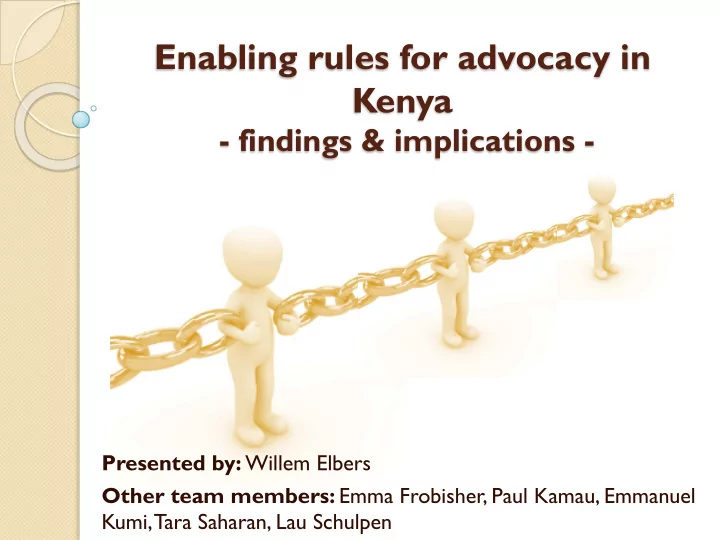

Enabling rules for advocacy in Kenya - findings & implications - Presented by: Willem Elbers Other team members: Emma Frobisher, Paul Kamau, Emmanuel Kumi, Tara Saharan, Lau Schulpen
Research Question How does the institutional design of aid chains influence the ability of CSOs in the Global South to undertake advocacy work? Institutional design: the formal and informal rules that guide behaviour within institutional arrangements
Research design Comparative case study in Kenya: Instrument Organisation Program T opic Working Strategic Hivos Women@work conditions Partnership (SP) horticulture Gender Accountability HakiYetu, Jukumu CREAW based Fund (AF) Letu violence Amplifying the Rights Accountability UDPK Voices of Women disabled Fund (AF) with Disabilities women
(Political) roles In both SP and AF-cases, CSOs undertake various political roles related to ‘dialogue’. Only in SP-case we see ‘dissent’. ◦ Embassy pressured Hivos to refrain from dissident strategies targeting Dutch companies Rules set in design phase concerning strategy, roles and partner-selection determine the type of advocacy work undertaken ◦ Hivos & Embassy play central role in setting these rules
Added value of Hivos & Embassy Added value Hivos Embassy Providing funds otherwise not available X X Brokering between stakeholders X X Enhancing credibility partners X X Co-creating advocacy strategy X X Providing security X Capacity strengthener X X Linking to international level X It is in fulfilling roles that added value is created
Decision-making, funding and accountability Rules for decision-making, funding and accountability have several unintended and negative effects Accountability becomes stricter further in the chain ◦ Hivos, CREAW and UDPK impose much stricter reporting requirements, largely to streamline different donor requirements The Embassy and the Ministry’s accountancy department add new managerial accountability rules to those of DSO
Power & agency Power inequalities not very visibile for donors/INGOs ◦ à little ‘open’ exercise of power à largely exercised indirectly by setting rules ◦ à CSOs (partly) refrain from speaking out Application rules not uniform and depends on project-officer and organizational capacity CSO
Differences between SP and AF Four key differences: 1. Unlike the Dutch Ministry, Hivos Netherlands plays a key role in SP-case 2. AF programs target issues not sensitive to Dutch interests 3. The scope of AF programs is smaller 4. In the AF cases, the qualities of individual (embassy) staff members are more crucial
Policy messages Having local CSOs co-drafting rules of SPs is best way to address power inequalities Addressing negative effects managerialism implies convincing other donors as well Address internal in-consistencies regarding managerialism within Ministry Strengthen added value aid chain, rather than reducing negative effects Direct funding is no alternative for Strategic partnerships
Thank you for listening! Questions?
Recommend
More recommend